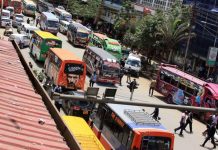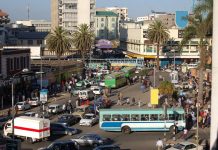When they first emerged, matatus were quite befittingly known as “pirate taxis”.
They were messy, unkempt and were competing against a British giant, Kenya Bus Services, which had been given a colonial monopoly to run an orderly passenger transport service within the city — complete with a time table.
More than 60 years later, the mayhem has turned to anarchy and gangsterism, the playground for extortionists.
Had this monopoly not been given, perhaps, the matatu mayhem story would have evolved differently.
ILLEGAL COMPETITORS
Matatus were originally seen as the illegal competitors to KBS, as it was known, and both the municipal authorities and the government treated them as much.
They would evolve as illegal entities — rather than the multi-billion-shilling transport industry that it now is.
It all started on January 8, 1934 when the Nairobi Town Clerk F.S. Eckersley announced that the municipal council, with the approval of the governor, would no longer allow omnibuses to operate within the city unless they had entered into an agreement with the council.
The prohibition was to start on March 1, 1934 when the Overseas Motor Transport Company (OMTC) was given that right — and with that the stubbornness of private pirate taxis started.
NAIROBI POPULATION
By then Nairobi had a population of 50,000 people and OMTC brought in 13 Albion buses to serve 12 routes.
The fleet was put on the road in 1934 with the first services covering Pangani, Shauri Moyo and the “dusty track” to Dagoretti Corner.
“Drivers and passengers could see lions sometimes lying in the ditches beside the roads,” recalled pioneer conductor Ramathan Almas in a 1966 interview.
The buses were for many years fitted with a machine to record speed so as to stamp out inconsiderate driving.
For starters, the story of transport in Nairobi is the story of Commander Frank Hare — and his friend John Watts — who insisted on getting a monopoly if he was to invest his money in an African transport enterprise, which had its origin in the small Devonshire village of Oakhampton.
By the time they arrived in Nairobi, Mr Hare had been to Cairo and Salisbury (Harare) where he had floated and successfully sold similar ideas.
KBS MONOPOLY
And the man was always lucky for in 1934, he got the Kenya Bus Services Ltd monopoly in Nairobi before extending it to Mombasa in exchange for a 25 per cent share in the company, for 50 years. On 1 January 1939, Mr Hare launched Uganda Transport Company Ltd; all under the umbrella Overseas Motor Transport Company.
But Mr Watts was the better known having started running buses in South Wales in 1921 and by 1937 — the same time Kenya Bus Service was picking tempo in Nairobi.
Mr Watts had formed Red & White United Transport Ltd as a holding company for the organisation.
What we know is that after getting the Nairobi monopoly, Mr Hare made an application to run the ferry service too — and if he did not get that, he would lease the ferries.
But the Mombasa Board, which was running the coastal town, persisted in their refusal and the government tried to sneak the OMTC request through an Act of Parliament, which also failed. The ferries remained with the East African Railways.
PRIVATE TAXIS
It was in Nairobi that the private taxis would attempt to sabotage the British monopoly by ferrying passengers at dawn and evading police.
From rickety Austins, Peugeots and wobbly Volkswagen Kombis, the Nairobi eastlands became the bastion of these contraptions which survived, thanks to the mechanics at Grogan (now Kirinyaga) Road, some of who had been staying in Kenya’s first slum, “City Carton” — before they were given a new village to settle which they promptly named Huruma.
The pirate taxis were cheap and faster than the buses which ran under a strict time table and did an average of 12kph during peak hours.
The matatus, as they later came to be known, would be driven at the high speed of 32km per hour — a shocking speed by then.
TLB
The colonial government had also established the Transport Licensing Board (TLB) to regulate the sector.
From the early days, the matatus had a multiple effect on the transport monopoly in Nairobi held by the Kenya Bus Service since 1934 when it was incorporated as private company with an authorised capital of Sh20,000.
Although KBS had in 1950 converted into a public company with the British United Transport Overseas Company (UTOC) jointly owning the company, it was unable to buy more buses thanks to the competition offered by the matatus’ illegal competition.
ORIGIN OF ‘MATATU’
The name ‘matatu’ was derived from the fare they charged of 30 cents for any destination within Nairobi.
(Matatu means three in Kikuyu language and it came from the three ten-cent coins (mang’otore matatu) that one paid for the fare, which was ten cents cheaper than KBS.
Matatu supporters saw them as the alternative mode of transport, albeit with a messy thread: Drunk drivers, expired road licenses and insurance stickers.
Once, a Kiambu court found that one private taxi had a ten-year-old insurance sticker still stuck on the wind screens.
POWERFUL FORCE
Matatus fully emerged as a powerful force in 1950s after the arrival of World War II veterans who staked claim for the Nairobi transport sector, albeit illegally — and as part of a silent protest to dare the colonial system.
They would also employ hawk-eyed assistants who operated like colonial guards (askari kanga) before they came to be known as makanga.
They would also be known as “touts” and “manamba” — a reference to the boisterous gangs of the matatu industry.
Independence in 1963 did not help the matatus either and in 1964 Transport and Licensing Board chairman J.K. Gatuguta declared the just about 100 pirate taxis in Nairobi “illegal” which sparked criticism from the Kenya Transport and Allied Workers Union (Ketawu).
Most of these operated from Jericho, Maringo, Kaloleni, Mbotela, Jerusalem, Hamza, Makadara, and Makongeni — (collectively called Eastlands) — and traffic police made it their duty to pursue them as offenders. But they would still operate during peak hours in the morning and evening to avoid the police.
BANNED COUNTRY BUSES
The City Council had also banned country buses to run through the central business district or pick passengers — even though the Kenya Bus Service buses were not enough.
The country buses, mostly owned by indigenous Kenyans, had been given their own terminal — Machakos Country Bus Stage — which was in downtown sandwiched between Gikomba, Ladhies railway quarters and Muoroto slums.
The reason the Nairobi City Council was opposed to the matatus is that it had a stake in KBS.
That explains why the hunt on the pirate taxis was brutal.
But with weak laws to manage them, the crackdown was left to the Minister for Power and Communications, Mr Ronald Ngala, who had no time for them.
DO AWAY WITH MATATUS
“Very soon the Government intends to introduce very firm measures designed to do away with matatus or any unlicensed vehicles that currently operate very dangerously on our roads,” said Mr Ngala on December 7, 1970.
“The Government cannot accept the excuse given by the owners of such vehicles or their supporters that they are providing a cheap service.”
Ngala introduced a raft of rules governing the transport industry and only slowed down after he was summoned to State House by Jomo Kenyatta after banning lorries from travelling at night.
The railway was not helping either.
By 1970, the Kenya Railway was still insisting that a passenger transport to Eastlands would not be viable.
The General Manager, Dr E.N. Gakuo (father to First Lady Margaret Kenyatta) said then that they “have never been asked to do a survey”.
MATATU CRACKDOWN
In January 1972, the police officially launched a campaign to get rid of matatus and urged the public to help.
They described the matatus in Nairobi as “uninsured, unhygienic, unlicensed and dangerous” to operators and passengers.
Though police were looking for a total boycott, this did not work either.
The work of the traffic police on the roads was from then cut out: Crackdown on pirate taxis and pull them out of the road! It is a crackdown that has never stopped.
That police still flag down matatus and extort money is a historical ritual.
COUNTRY BUS ROUTES
After managing to stymie the growth of Kenya Bus in Nairobi, the matatus then invaded the country bus routes.
Most of the leading politicians had started bus companies and bus owners were the elite of the African block.
Afraid that they were losing the battles to the matatu, the country bus owners had an appointment with Jomo Kenyatta at his Gatundu home where they hoped that they would secure a total ban.
Kenyatta listened to the woes facing bus owners in all the routes in the hands of matatus.
He then asked their leader, Dedan Nduati, who owned the Jogoo Kimakia Bus Service, how many matatus he would buy after selling one of the Jogoo buses.
SELL BUSES
Mr Nduati said ‘several’ and Kenyatta is said to have remarked, according to a later interview by former TLB chairman Gatuguta: “Go and sell the buses and buy matatus.”
A few months later, on June 1, 1973, Kenyatta exempted all vehicles under three tonnes from paying TLB licences.
For the first time matatus were recognised as a mode of transport.
From only 373 vehicles in 1973, the number of matatus in Nairobi rose to 1,567 in 1979.
In 1982, they formed the Matatu Vehicle Owners Association to lobby for more routes but it was banned in 1988 after they staged a strike.
MAYHEM
In 1989, President Moi allowed matatus to start operating within Nairobi’s central business district, opening doors to mayhem.
He also introduced the Nyayo Bus Service which, for the first time, challenged the KBS monopoly.
Facing competition from matatus and Nyayo Bus, KBS was bought by Kanu mandarins led by Samuel Gichuru — the Kenya Power Managing Director — who stashed hundreds of millions in an offshore account in Jersey Island.
In 1999, new legislation was passed requiring matatus to obtain TLB licences.
More rules were introduced by John Michuki in 2004 to help curb the matatu disorder — but the police failed to enforce them.
Instead, they saw an excuse to get bribes.







![Top 20 Used Cars to Avoid Buying in Kenya – [PHOTOS]](../../../blog/wp-content/uploads/2013/11/top-used-unreliable-cars-to-avoid2-80x60.jpg)
![Here are some of the best tuned cars in kenya by state of the art garages [PHOTOS]](../../../blog/wp-content/uploads/2013/11/29402_10151301757042065_340470732_n-e1384498044289.jpg)


![Top 20 Used Cars to Avoid Buying in Kenya – [PHOTOS]](../../../blog/wp-content/uploads/2013/11/top-used-unreliable-cars-to-avoid2-100x70.jpg)






